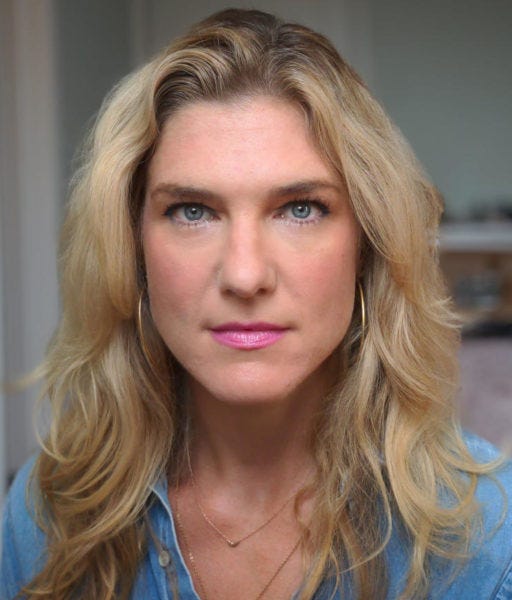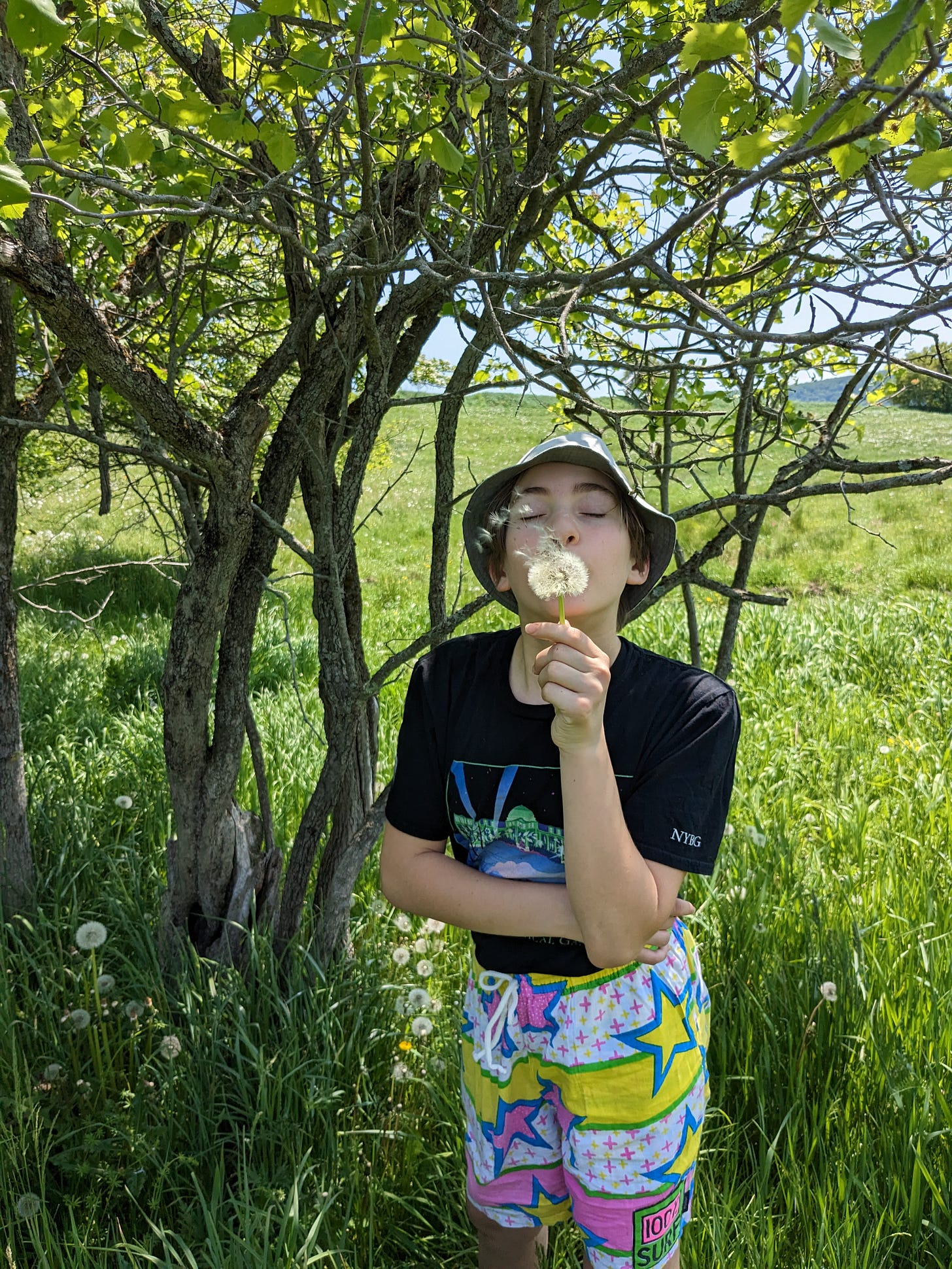'Climate grief, like all grief, is a form of love'
5 questions for journalist, mom, and climate activist Anya Kamenetz
It’s not too late to join us for our free Examined Family online book club meeting on Needy by Mara Glatzel at 9am PST / 12pm EST today! RSVP here. Buy the book here. Mara will join us! We can’t wait to hear your thoughts, questions, and experiments with reclaiming your sovereignty.
To keep vital interviews like this coming your way, please subscribe to Examined Family. And if you’re already a subscriber, but have never paid for this weekly goodness, please consider upgrading today. 🙏🏼
The day the sun never really rose, at least as we’d known it, and then when it did, it was a bright, scary orange, was the day that I could no longer deny that climate change was going to impact my kids in profound and potentially devastating ways. I remember my then 1st grader logging on to her zoom class for the day, and hearing her teacher, Ms. Aviles, try to explain what was going on to the rapt kids. I, too, listened like a child. I, too, looked to this fairly new teacher, this woman in her 20s, to explain to me what was happening, to please please please say it was all going to be okay.
That memory was brought back in a big way for me this month when New Yorkers posted so many pictures about their own AQI danger and frightening skies. Welcome, I felt like saying. This is what we were talking about back on September 9, 2020. I can only imagine how folks from the Global South must feel, who have been confronting the worst of climate change impacts for years and trying to sound the alarm bells to deaf ears.
It’s not all going to be okay, but that doesn’t mean we shouldn’t be talking about it and taking action—on behalf of and with our children. I was excited to catch up with journalist Anya Kamenetz to hear about her latest work on tackling climate change intergenerationally. She is a journalist I’ve long respected for her sober, but hopeful approach to various topics, so I knew she’d be a steady guide into this uncharted territory for so many of us. Meet Anya…
Courtney Martin: Only about half of parents have talked to their children about climate change. Maybe it’s the Oakland bubble I’m in, but this seems rationally impossible. The impacts of climate change are everywhere and kids ask such great questions. How can parents get away with this omission?
Anya Kamenetz: Children accept what’s in front of them as normal. Whether that’s not being able to go outside because of wildfire smoke, 117-degree days in Austin, or a winter with no snow, they don’t necessarily see or realize that we’ve departed from long-term climate trends, unless adults take time to explain that. Most US schools actually aren’t teaching about climate change or only making fleeting mentions. It’s also hard for young children to conceptualize the entire planet as a living system (it’s hard for lots of adults also). So unless you take the time to break it down for them in kid-friendly language, they're not necessarily going to know what to ask.
It’s only in the last year or so that I’ve been hearing people really acknowledge climate grief, especially in popular media. Can you talk about what that is and why it gets in the way of us being honest with our kids and taking action alongside them?
Walking down my block in an N95 mask on the second day of New York City’s air emergency earlier this month, I came upon a dead baby bird, a fledgling, that had fallen out of its nest. Just that morning, my six year old had said to me, “I wonder if the animals and birds have sore throats.”
Climate grief, like all grief, is a form of love.
It’s a sign of the blessed fact that we are connected to other living things. We feel their pain, whether we witness it directly or read about it on the news.
Climate grief also includes anticipatory grief, mixed with existential dread: How long will we be able to vacation on Fire Island before a storm takes it out? Will my parents’ home in New Orleans be destroyed in this year'‘ hurricane season, or next year’s? And the big one: what, exactly, will my girls have to contend with in twenty years’ time?
Psychologists say that climate grief can be considered a form of disenfranchised grief, because it’s still not fully socially acceptable to talk about it, even though it potentially affects everyone alive. And it also reminds me of what I felt during my two-year struggle with infertility, because it is a form of mourning that is prolonged without any certain resolution in sight.
So where does that leave us as parents?
It’s one thing to be with our children in their own big feelings. But when you are experiencing deep feelings of your own, it’s very hard to know how to share that truth. Too often, I believe these feelings are remaining unresolved and unaddressed and we are spending energy trying to bury or run away from the pain instead of taking action together.
Tell me a bit about your own journey as a mother around this stuff. When did you first realize that this needed to, not only be a centerpiece of your work as a journalist, but a central focus of your life as a mother and citizen and human being?
You know, like so many things it happened gradually, and then suddenly. In the summer of 2018 I read both a terrifying IPCC report and the paper Deep Adaptation, which discusses the possibility of social collapse, and there was a particular summer night when I was gathered with a bunch of girlfriends, all moms, and we were drinking wine, and I confessed that I was actually scared shitless about climate change and particularly the human implications, and one by one they all did too. These were serious women who worked on housing and in medicine and education and criminal justice reform and racial justice, and it was oddly incredibly validating to realize that we were all so worried about this.
It was not long after that that my daughter, then seven years old, brought it up to me in the most devastating way, as I’ve written about.
First I tried to shift my beat towards climate while still working for NPR, but that turned out to be pretty difficult since I’d built my whole career up in a different area. And it took a couple of years, and a pandemic, during which I wrote a book, and probably some degree of burnout from all of the above, for me to realize that I just had to make a break and go where my heart was.
How do you help parents distinguish between green washing and real impact? I can really get myself twisted up in knots sometimes as I’m sorting my soft plastic for our community’s Ridwell recycling service thinking that I’m just performing my dedication and wasting my time.
I do recommend biting off the big things first. We need to vote, we need to protest, and organize for changes in our school communities and in our workplaces, places of worship--everywhere groups of people are connected. We need to support front line groups with our money and our time.
On a personal level, look at the energy use in your home, your transportation use (can you replace one flying vacation with a driving vacation next year?), your family’s diet, and where your money is. Check out Project Drawdown to help visualize what climate solutions really do have the most impact.
But that doesn’t necessarily tell you what to do about the recycling. My personal feeling is do it only if it feels meaningful. We need to all be learning and growing and moving on this stuff and be better this year than we were last year.
I once had a chance to interview the wonderful Indigenous climate activist Xiye Bastida, who was then in high school, and who said that her father often told her “You cannot fix the world if you do not fix up your room.”
Which is a funny thing for a dad to say but also another way of saying, the small stuff does matter. I believe that everyone should engage in the personal actions that feel meaningful to them, a lot of which can have other benefits as well-- for health, well-being, or saving money -- do it to remind yourself that you have agency, to show your kids, and do it to build energy and momentum for the bigger stuff.
Describe the last moment in nature with your kids that made you feel hopeful.
It was actually on our family’s new farm, which we visited on Memorial Day weekend. We first saw the land a year ago and made a snap decision to buy it. My husband is lending a hand on the business side and hoping to transition into this field (no pun intended) full time. It’s a “regenerative agroforestry” project, following restorative permaculture practices that will grow food, help the soil trap rainwater and store carbon. My girls had fun moving a few hundred young pullets from the warm indoor nursery to the outdoor chicken tractor, which is a moveable pen that allows them to scratch and peck at new grass each day between the rows of hazelnut bushes and chestnut and hickory seedlings. We also got to roast marshmallows and climb trees and blow infinity dandelion wishes.
Want to learn more? Listen to Anya’s NPR story about talking to your kids about climate change. Read this white paper she collaborated on about climate change and kids.
We’re donating to The Climate Mobilization in honor of Anya’s labor. Feel free to pile on!
And please, let’s share our experiences of talking to kids about climate change, our own relationship to climate change grief, and more in the comments section. I’m sure there are so many of us in the Examined Family community who resonate with this topic.






I'm incredibly grateful for this introduction to Anya Kamenetz! She is definitely an inspiration to us all and I support all of her views and actions.
I liked especially her urging us to PROTEST. This reminds me of the magnificent nonviolent activist Barbara Deming and her wonderful essays in "On Revolution and Equilibrium". If you haven't read her wok, then this pamphlet can be ordered through the War Resisters League.
I worked with Deming in the '60's and 70's, having joined the WRL because of pacifists like her. She and I worked together in the Civil Rights movement and against the Vietnam war. The cause of climate change that Anya Kamenetz eloquently advocates represents another urgent issue like those of racism and sexism that can be confronted through nonviolent civil disobedience. DD
I was happy to read the recommendation to Project Drawdown. I obtained my copy of their comprehensive report a few years ago and found it the single most valuable resource I have encountered for deciding what my own actions and advocacy should look like.
But the website is also a pot of gold for someone wanting to study up on what we can do do reverse climate change.